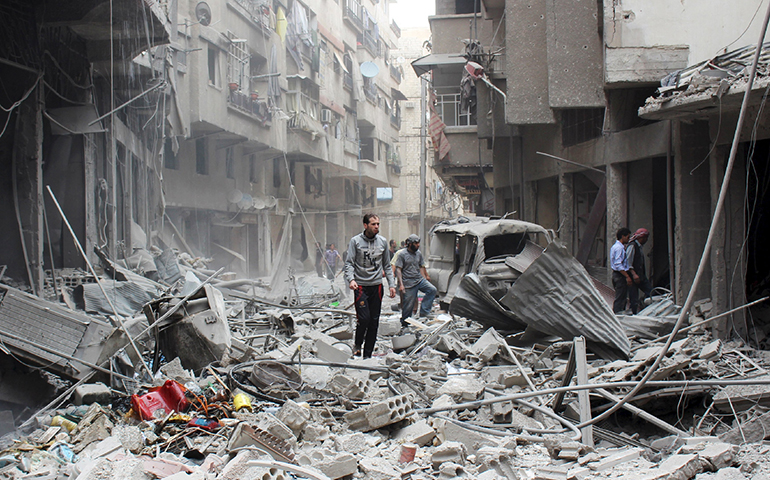
Civilians inspect a damaged site after what activists said were airstrikes by forces loyal to Syria's President Bashar Assad in the Damascus suburb of Ain Tarma May 14, 2015. (CNS/Reuters)
Editor's note: This editorial was published in our print issue dated March 25, 2016, which went to press March 16. On March 17, U.S. Secretary of State John Kerry declared that the Islamic State group's atrocities committed against against Yezidis, Christians, Shiite Muslims and other minorities were genocide.
No words we could write on this website could adequately describe the horror and desperation that has become daily life in Syria. The statistics from that region are nearly incomprehensible. In 2011, before the civil war broke out, Syria had a population of just over 21 million people. Today:
- 4.6 million Syrians are living outside Syria as refugees;
- 6.6 million are displaced within Syria -- half of them children;
- 13.5 million people in Syria need humanitarian assistance;
- 250,000 Syrians have been killed and more than a million wounded.
At the heart of the horror is a civilian population and infrastructure that have been targeted in this war. More than 25 percent of the country's schools have been destroyed. More than 1.2 million homes have been damaged and 400,000 destroyed since the onset of the conflict.
Nearly two-thirds of hospitals and clinics have been destroyed or substantially damaged. Seven hundred health care workers have been killed.
According to U.N. figures, 500,000 Syrians were living under siege conditions in February; international aid organizations put the number at a million. In areas under siege, civilians are deliberately deprived of basic services, including water, electricity, food and medical care.
According to the international aid group Save the Children, people are dying of starvation in besieged areas just miles from warehouses packed with food. Of the 18 areas identified as besieged in February, 15 were under the control of Syrian government forces.
Trucks laden with humanitarian aid have been rolling across the border from Turkey into areas of acute need in Syria since mid-February. Though they still are not numerous enough to sate the need, those loaded trucks are the most convincing signs of hope in many months that the violence that has swallowed Syria and parts of Iraq and spilled over into their neighbors may be ending.
But that hope is fragile. Indeed, by the time these words are read, it may have dissipated.
As the fifth anniversary of the conflict approached, negotiators for the Assad regime and the opposition had begun long-delayed peace talks in Geneva. Underscoring the fragility of the situation, neither side agreed to meet with the other and neither would brook talk of concessions. Still, they agreed to 10 days of talks with the United Nations envoy to Syria, Staffan de Mistura.
The humanitarian trucks are rolling and preliminary talks are underway in large part because of the "cessation of hostilities" brokered by U.S. Secretary of State John Kerry and Russian Foreign Minister Sergei Lavrov. But the details of the deal reveal the weakness that yet may kill it. No parties have signed an agreement; there is no enforcement mechanism; not all hostilities have ceased; and Russia, acting as proxy for the Assad regime, has taken full advantage to secure territory, even as Russian President Vladimir Putin said March 14 that he would start pulling his armed forces out of Syria. The United States is having trouble keeping its coalition focused, battling resistance at home and competing interests among its allies, most notably the Turks and Kurds.
Numerous commentators have said two things are keeping diplomatic channels open: the exhaustion of the combatants and the terror of the abyss if this sectarian war deepens. Others also cite Kerry's unflagging persistence. Fragile as it is, this process remains the best way forward.
This crisis is disrupting societies from Damascus to Berlin. A solution to Syria will have to involve an international agreement. First and foremost, the world community must staunch the flow of refugees.
This will require two acts. One, the world community must generously fund humanitarian relief to Syria and its immediate neighbors. Two, the international community must protect civilians. Food, water and medicine cannot be used as instruments of war. The use of cluster bombs, barrel bombs and poison gas must also be stopped.
With aid and security in place, refugees will stop their migration. To get those who have already left their homeland to return, the international community must commit to long-term support to rebuild Syria's physical infrastructure. Schools, hospitals and houses must be rebuilt so that refugees and migrants have places to return to. Once back home, Syrians can then contribute to their own rebuilding.
New political structures must accompany the physical rebuilding. Though the military aspect of this civil revolution has ground to a stalemate, the impetus for it has not changed. Bashar Assad has lost the confidence of the people he hoped to govern. His regime will have to be replaced. It will not come quickly enough for some, but an internationally supported transitional movement must begin.
Rebuilding Syria will not be cheap, but it can be done for less than what the U.S. and Russia are spending now on combat operations: $11.5 million per day by the U.S. in 2015 and $7.5 million per day by Russia. In contrast, Russia pledged $9 million in humanitarian aid to Syria for all of 2015; in February, the U.S. pledged $600 million in humanitarian aid for this year.
At the international donors meeting in London in February, the U.N. received a record $10 billion in pledges for humanitarian relief and long-term rebuilding of Syria. That is an impressive amount, but the truth is the U.N. received only $1.25 billion in donor pledges last year, which covered only 43 percent of the needs. We must do better.

